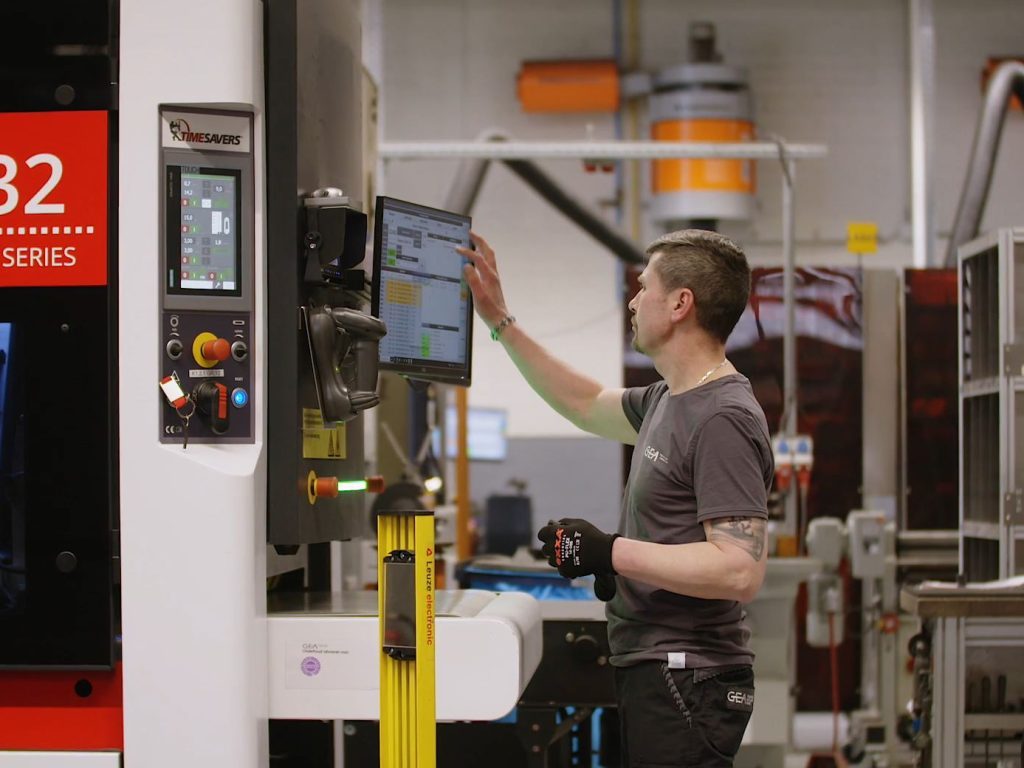The manufacturing of packaging machines is high-tech. Just ask Allard van Haaften from GEA Food Solutions. The multinational’s machine factory is located in Weert and specialises in machines for packaging food and lollipops (both for production and packaging). A directionless finish is desired for these packaging machines.
A technician from GEA Food Solutions works on fine-tuning a lollipop packaging machine. Allard van Haaften asks if he would like to give a demonstration. He is responsible for Supply Chain & Operations at GEA Food Solutions. “We are in the test phase and only have a fraction of the capacity”. Nevertheless, the lollipop packaging machine shoots packed lollipops into a collection tray. And the machine is able to do it faster. “We do between 800 and 1400 lollipops per minute,” Van Haaften says. “This number depends a little on the shape and size of the lollipops.”
Worldwide
GEA Group is one of the world’s leading suppliers of machinery and systems for food processing technology and related industries. The company employs over 18000 people and is located in 62 countries. At the Technology Centre in Weert, it is clear that high-speed packaging is no mean feat. But whether it is packaging chicken, nuts, lettuce, sweets, chips or lollipops; GEA offers a solution.
Easy to clean
How do they make the machines in Weert? The basis is partly stainless steel sheet metal. That comes in and goes to the laser cutting machine. After the sheets go through the laser cutting machines, they are further processed in a Timesavers 32 RB series. Van Haaften: “The machines we make are largely made of stainless steel and anodised aluminium, because they have to be easy to clean. You don’t want to find any residue from a machine in a food product. Parts have to be perfectly flat, completely deburred.”
Timesavers machine
GEA Food Solutions has chosen the ’32 RB series’ after careful consideration. The 32 RB series is the compact dry wide belt grinder for deburring, edge rounding, finishing and/or laser oxide removal. “We mainly looked for a machine that would allow us to finish as smoothly as possible,” says Van Haaften. “Products come out of the laser cutter, are tapped – when necessary – and are finished in the Timesavers machine. The finished products go through the belt onto the return table. The return table is proving to be very valuable because it allows us to ensure that the machine is employable by many people working around the machine. Further down the assembly line, the machines are assembled into full-fledged food packaging devices.”
Directionless
Van Haaften stresses that directionless finishing is important. “A machine that you don’t finish directionless simply does not look nice. If you finish the sheet metal directionless, it doesn’t matter how you put the sheets in the Timesaver. Moreover, you do not want deep surface scratches because then the plate gets dirty faster and is harder to clean. This is a no-go if you work with food products.”
Meet the need
GEA Food Solutions has the Timesavers 32 RB series in operation for a year now. “Within a week, everyone was able to operate the machine flawlessly. Together with Timesavers, we examined how we could replace the existing machine with one that could both finish directionless and process very small parts. The promise was then made that we could finish a euro in terms of size. This was proved possible without any problems. We then went to the factory with lasered parts and did tests: how fast does the machine go, what grain size should we choose? This way, with Timesavers’ help, we chose the machine that suited us best.”
Brush selection
It was precisely in the area of brush selection and brush pressure that Timesavers’ expertise came in handy; GEA Food Solutions is an expert in packaging machines, among other things, but not in deburring. “We make a lot of single-piece operations and there is therefore a lot of variation. For us, the question was whether we could nevertheless use the same settings as much as possible. The sheets we process are generally between 1 mm and 3 mm thick. Sometimes we have pieces of 5 millimetres. We normally only use brushes for finishing and very occasionally a pre-grinding belt. You only need the pre-grinding belt if you need to remove a large burr. But rather not, because a grinding belt leaves marks anyway. And for us there is no debate: we want directionless.”
